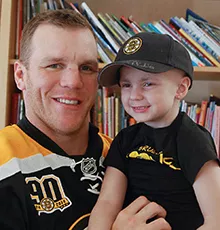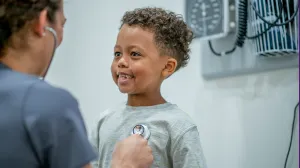
Three weeks after giving birth, Lauren Rudnicki thought something wasn’t quite right with her newborn baby girl Maggie Rudnicki. Maggie was very pale and had the chills, so Lauren followed her instincts and took Maggie to their pediatrician.
Lauren’s instinct was right. At the pediatrician's office, a blood test revealed that Maggie’s hemoglobin level – the protein in red blood cells that carries oxygen - was a life-threatening three and she needed immediate medical attention. An ambulance arrived at their home minutes after the doctor called with the results. When Maggie arrived at Eastern Maine Medical Center doctors told Lauren that if she hadn’t brought her in when she did, Maggie wouldn’t have woken up the next morning.
Tiny Maggie was diagnosed with Diamond Blackfan Anemia, a rare genetic blood disorder that occurs when the bone marrow fails to make red blood cells your body needs. Weekly blood transfusions quickly became a way of life for Maggie, as did talk that Maggie might need a bone marrow transplant. Her brother Lucas was a match and knew at a young age he had the “superhero blood” that would one day help his baby sister.
After four years of blood transfusions, painful nightly chelation treatments to remove the excess iron buildup in her liver (a result of the transfusions since her body wasn’t using the iron to make red blood cells), and frequent trips to Tufts Medical Center for their sophisticated MRI technology to monitor Maggie’s liver, she was ready for transplant.
In July 2013, Maggie and her family came to Boston to start the transplant process under the care of the Division of Pediatric Hematology/Oncology and Jason Law, MD. Maggie began intense chemotherapy to rid her body of her own bone marrow while her brother Lucas had the procedure to harvest his “superhero blood.”
“The staff (including Child Life Services) was always great with Maggie, but she was used to the hospital. My son wasn’t and they were just incredible. From giving him a tour of the operating room to showing him a surgical mask, they made the experience less scary for him,” said Lauren.
Maggie had her transplant and endured a couple of difficult weeks as they waited for her white cells to come back. But once they began to come back “it was like a light switch flipped” and she improved dramatically. She remained in the hospital for eight weeks, all the while Lauren and her husband stayed in the Neely Pediatric Bone Marrow Transplant Unit family area right across the hall from Maggie’s room.
After she was discharged, Maggie still required numerous appointments on a weekly basis. Thanks to the Neely House, which provides in-hospital accommodations for families of patients with cancer and blood disorders, they were able to spend the next two months close by without the five hour drive to and from their home in Levant, Maine. “The Neely House was a huge part of why we came to Tufts Medical Center. Being inside the hospital was a huge comfort as a parent to know you were a two minute walk from a doctor if you needed one. The Neely House is a huge blessing for families that don’t live close.”
Maggie’s immune system continues to normalize post transplant, but she’s doing well. Unfortunately, a bone marrow transplant was not a cure for Maggie given the genetics of her anemia, but it does make it so she doesn’t need weekly transfusions. She’s back to getting her regular care at Eastern Maine Medical Center, but knows Tufts Medical Center is there if she needs it.

A huge Boston Bruins fan since she was two years old, Maggie has now begun learning to play hockey like her favorite player Shawn Thornton. “Her coaches can’t believe her energy,” says Lauren. “It’s amazing to see the change in her, to see her having fun like other kids.”
“I’m so thankful that they [Tufts Medical Center] were here for us,” said Lauren.
The compassionate and leading-edge care Maggie received was made possible thanks in part to the generosity of donors like the Cam Neely Foundation for Cancer Care. Philanthropy to Tufts Medical Center helps provide the most advanced and personal medical care available.


